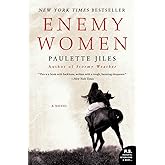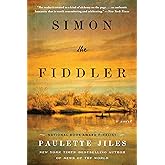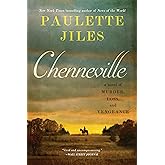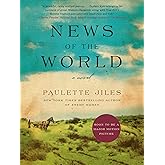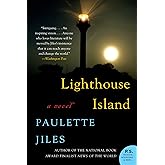Buy new:
-33% $12.74$12.74
FREE delivery February 4 - 5
Ships from: Fifty Third Street Books Sold by: Fifty Third Street Books
Save with Used - Good
$8.76$8.76
Ships from: Amazon Sold by: Jenson Books Inc

Download the free Kindle app and start reading Kindle books instantly on your smartphone, tablet, or computer - no Kindle device required.
Read instantly on your browser with Kindle for Web.
Using your mobile phone camera - scan the code below and download the Kindle app.



 Audible sample
Audible sample Stormy Weather: A Novel Paperback – June 10, 2008
Purchase options and add-ons
Oil is king of East Texas during the darkest years of the Great Depression. The Stoddard girls—responsible Mayme, whip-smart tomboy Jeanine, and bookish Bea—know no life but an itinerant one, trailing their father from town to town as he searches for work on the pipelines and derricks. But in a year of devastating drought and dust storms, the family's fortunes sink further than they ever anticipated when a questionable "accident" leaves the girls and their mother, Elizabeth, alone to confront the cruelest hardships of these hardest of times.
Returning to their previously abandoned family farm, the resilient Stoddard women must now place their last hopes for salvation in a wildcat oil well that eats up what little they have left . . . and on the back of late patriarch Jack's one true legacy, a dangerous racehorse named Smoky Joe.
- Print length368 pages
- LanguageEnglish
- Publication dateJune 10, 2008
- Dimensions5.31 x 0.83 x 8 inches
- ISBN-100060537337
- ISBN-13978-0060537333
Frequently bought together
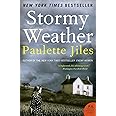
Customers who viewed this item also viewed
Editorial Reviews
Review
“Jiles’s follow-up to her highly praised debut, Enemy Women, [is] a deeply satisfying novel with wide appeal.” — Library Journal (starred review)
“Jiles’s eloquent, engaging novel celebrates four strong women toughing out the Great Depression . . . [a] gritty saga.” — Publishers Weekly
“[A] stirring story . . . of self and home in language as spare and stark as the Texas landscape.” — Booklist
From the Back Cover
Oil is king of East Texas during the darkest years of the Great Depression. The Stoddard girls—responsible Mayme, whip-smart tomboy Jeanine, and bookish Bea—know no life but an itinerant one, trailing their father from town to town as he searches for work on the pipelines and derricks. But in a year of devastating drought and dust storms, the family's fortunes sink further than they ever anticipated when a questionable "accident" leaves the girls and their mother, Elizabeth, alone to confront the cruelest hardships of these hardest of times.
Returning to their previously abandoned family farm, the resilient Stoddard women must now place their last hopes for salvation in a wildcat oil well that eats up what little they have left . . . and on the back of late patriarch Jack's one true legacy, a dangerous racehorse named Smoky Joe.
About the Author
Paulette Jiles is a novelist, poet, and memoirist. She is the author of Cousins, a memoir, and the novels Enemy Women, Stormy Weather, The Color of Lightning, Lighthouse Island, Simon the Fiddler, and News of the World, which was a finalist for the 2016 National Book Award. She lives on a ranch near San Antonio, Texas.
Excerpt. © Reprinted by permission. All rights reserved.
Stormy Weather
A NovelBy Paulette JilesHarperCollins Publishers, Inc.
Copyright © 2008 Paulette JilesAll right reserved.
ISBN: 9780060537333
Chapter One
When her father was young, he was known to be a hand with horses. They said he could get any wage he asked for, that he could take on any job of freighting even in the fall when the rains were heavy and the oil field pipe had to be hauled over unpaved roads, when the mud was the color of solder and cased the wheel spokes. The reins were telegraph lines through which he spoke to his horses in a silent code, and it seemed to Jeanine that her father's battered hands held great powers in charge. He could drive through clouds or floods. During the early oil strikes in Central Texas he was once paid $1,250 to drive a sixteen-mule team hauling a massive oil field boiler from McAllister, Oklahoma, to Cisco, Texas. He got it across the Red River Bridge and through the bogged roads of North Texas without losing a mule or a spoke or a bolt.
Jeanine sat beside him on the wagon seat and watched the horses plunge along. They were buoyant, as if they were filled with helium. This particular morning his hands shook when he rolled a cigarette because the night before he had been drinking the brutal intoxicating mixtures that were sold because the Volstead Act was still in effect that year, 1924. After an hour they came to the oil field and her father told her to stay in the crisscross shadow of the derrick until he got his deal done because he and the foreman were probably going to sit around and talk and cuss for a while. You can't step past those shadows, there. Don't go playing around the horses' feet. Here, read this comic book. She sat and read from panel to panel as Texas Slim shot his way through the saloon doors on his horse Loco. She couldn't keep her mind on it and so she walked the shadows of the derrick and pretended they were dark roads leading her away to distant countries like Mars and Boston and Oklahoma.
Her father talked with the driller about pipe to be hauled and how much a load and how many loads. The driller needed casing pipe, and casing pipe weighed more than drill stem so her father was trying to get paid by weight as well as by the load. After they had agreed and shook hands, he stood up carefully to balance his enormous beating head on his shoulders and called out, "Jeanine, come on, we've got to go."
Jeanine came to stand against her father's knees. All the machinery was still. The oil had been found and was being held below their feet, dark and explosive, until the crew would let it up through the casing pipe.
She said, "Let me drive the horses." Jeanine had a low voice and it made her sound like an immature blond dwarf.
Her father patted her heavily on top of her head. "You're too little to drive."
"But I want to play Ben-Hur."
He smiled. "You can't be Ben-Hur, honey, you're a girl."
The week before they had gone to see the movie star Raymond Navarro playing Ben-Hur in a toga, in screenland black and white, ripping around the arena at a suicidal speed, lashing a whip.
"Yeah, but he was wearing a dress, and I'm the one that's got the pants on."
Her father laughed and held his head. Jeanine was so relieved that her own laughter had a frantic sound and tears came to her eyes. The driller thought it was funny as well and he repeated it to the crew several times over and even after a week the driller could be heard to say Don't mess with me, boys, I'm the one that's got the pants on.
They started home. They lived in half of a rent house in Ranger, where they had moved as soon as there was word of an oil strike. Before that they seemed to have lived on the old Tolliver farm, but Jeanine was too young to remember it. Her father's strong hands were scarred, they had been knocked around by everything, by engine cranks and coffin hoists and the wagon jack. His cloth cap barely shaded his bloodshot eyes. All round them the horizon shifted from one red stone layer to another and down these slopes spilled live oak and Spanish oak and mesquite, wild grape and persimmon. Alongside the road were things people threw out of cars and wagons. A baby doll head lay under a dense blackbrush and seemed to watch as the hooves of the team went past. There were tin cans and mottled rags and lard pails and tiny squares of broken safety glass.
He reached under the seat and took out his bottle.
"If I have a drink now she'll never know by the time we get home." He took a quick drink and then handed the bottle to her. "Hide that for me."
Jeanine kneeled down and found the feed bags under the seat and stuffed the bottle in one of them and sat back on the seat again. She leaned against him. During the tormented shouting of the night before, Jeanine and her sister knew these were noises of pain. Their parents needed comfort.
"I love you," she said.
"You'll be mad at me too someday, Jenny," he said. "Before the world is done with me."
"But how come you threw the album out the front door?"
"Because the sewing machine was too heavy."
The photographs of herself and her sister Mayme tumbled down the steps like playing cards, like the doll head, discarded. Her mother and father's wedding portrait spun into the dirt. Jeanine and her sister Mayme picked them all up and carefully pasted them back into the album. Before long her mother and father would kiss each other. After that her father would be paid and they would buy a case of Lithiated Lemon soda and a radio and a race-horse.
Continues...
Excerpted from Stormy Weatherby Paulette Jiles Copyright © 2008 by Paulette Jiles. Excerpted by permission.
All rights reserved. No part of this excerpt may be reproduced or reprinted without permission in writing from the publisher.
Excerpts are provided by Dial-A-Book Inc. solely for the personal use of visitors to this web site.
Product details
- Publisher : William Morrow Paperbacks; Reprint edition (June 10, 2008)
- Language : English
- Paperback : 368 pages
- ISBN-10 : 0060537337
- ISBN-13 : 978-0060537333
- Item Weight : 9.6 ounces
- Dimensions : 5.31 x 0.83 x 8 inches
- Best Sellers Rank: #156,271 in Books (See Top 100 in Books)
- #19 in Canadian Literature
- #725 in 20th Century Historical Romance (Books)
- #1,401 in Contemporary Literature & Fiction
- Customer Reviews:
About the author
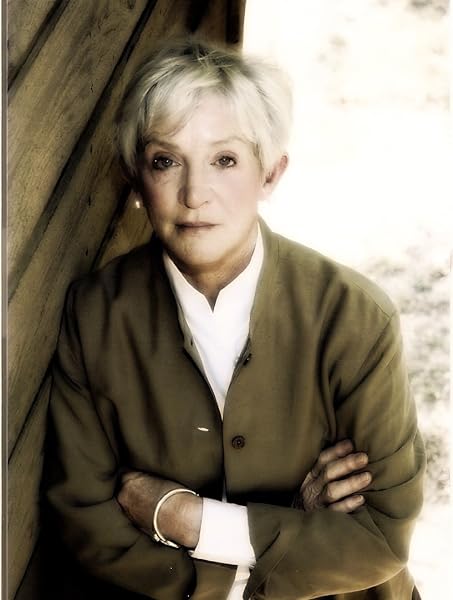
My website is paulettejiles.com. I review books and say shocking things and include outrageous pictures.
Paulette Jiles was born in Salem, Missouri, in the Missouri Ozarks. Raised in small towns in both south and central Missouri, she attended three different high schools, an exhausting process of social dislocation and fashion wobbles, and with relief graduated from the University of Missouri (KC) in Romance Languages. After graduation she worked for the Canadian Broadcasting Corporation in Toronto and in the far north of Ontario and in the Quebec Arctic, helping to set up village one-watt FM radio stations in the native language, Anishinabe and Inuktitut. She became reasonably conversant in Anishinabe but Inuktitut was just too much. Very hard. Besides she was only in the eastern Arctic for a year. Work in the north lasted about ten years all told.
She taught at David Thompson University in Nelson B.C. and grew to love the British Columbian ecosystems and general zaniness. She spent one year as a writer-in-residence at Philips Andover in Massachusetts and then returned to the United States permanently when she married Jim Johnson, a Texan. Has lived in Texas since 1995.
She and her husband renovated an old stone house in the San Antonio historic district and amidst the rubble and stonemasons and ripped-out electrical systems she completed Enemy Women. She now lives on a small ranch near a very small town in the Texas Hill Country with a horse and a donkey. If you want a free donkey, please let her know. She plays Irish tin whistle with a bluegrass group, sings alto in choir, rides remote trails in Texas with friends. Her horse is named Buck. News of the World (William Morrow) was a finalist for the National Book Award.
Customer reviews
Customer Reviews, including Product Star Ratings help customers to learn more about the product and decide whether it is the right product for them.
To calculate the overall star rating and percentage breakdown by star, we don’t use a simple average. Instead, our system considers things like how recent a review is and if the reviewer bought the item on Amazon. It also analyzed reviews to verify trustworthiness.
Learn more how customers reviews work on AmazonCustomers say
Customers find the book engaging and easy to read. They appreciate the well-developed characters and their realistic aging throughout the decade. The writing style is described as good and lyrical. Readers describe the story as believable, moving, and satisfying. They appreciate the historical accuracy and nostalgic feel of the book. However, opinions differ on the pacing.
AI-generated from the text of customer reviews
Customers find the book engaging and easy to read. They describe it as a good, compelling read that is hard to put down. The characters are described as sensitive, loving, and full of charm. While some aspects of the book are good, others are disturbing, readers appreciate the attention they pay to the story.
"...the peach orchard; and Bea is Beth, deeply sensitive, loving and loved, taking pleasure in nothing more than sitting with her cat while she..." Read more
"...beautifully written; each word chosen precisely and carefully - a pleasure to read...." Read more
"...But I digress, this is a wonderful book. Good for reading aloud" Read more
"An excellent read-- compelling and difficult to put down...." Read more
Customers find the characters captivating and strong. They appreciate the realistic aging of the characters over the decade. The book portrays American perseverance and character well. It's described as funny, human, tough, descriptive, romantic, and fast-paced.
"...Who knew? And mohair goat-shearing. The character of Jeanine was interesting but not notably so...." Read more
"...The descriptions are lyrical, the characters are memorable, particularly Jeanine, the middle sister...." Read more
"...Tremendous ability to put you there! Great characters. Every day history comes alive! I know it." Read more
"...The character development was well done, the primary characters aging realistically throughout the decade that the book reviews...." Read more
Customers enjoy the writing style. They find the prose good, with lyrical descriptions and memorable characters. Readers appreciate the author's mastery of language and ability to paint exquisite pictures with words. They love reading slowly and savoring every word and image.
"...Jiles has a remarkable ability to paint exquisite pictures with words, giving to the most mundane things a rare beauty: “The wind drove past and..." Read more
"Like other reviewers, I really enjoyed News of the World. There was a thread of hope and goodness in NOTW that was absent in Stormy Weather...." Read more
"...Their story is moving, wry, and poignant. It's beautifully written; each word chosen precisely and carefully - a pleasure to read...." Read more
"...But I digress, this is a wonderful book. Good for reading aloud" Read more
Customers find the story believable, moving, and satisfying. They describe the book as well-written and like a family reunion. The characters are described as realistic and the setting is described as fascinating.
"...Their story is moving, wry, and poignant. It's beautifully written; each word chosen precisely and carefully - a pleasure to read...." Read more
"...It is a good story about a woman's life that leaves the romance far in the background...." Read more
"A believable story of one family's survival of the Great Depression in Texas...." Read more
"This tale was like a family reunion. Warm & united, yet each person singular, warts and all...." Read more
Customers enjoy the book's historical accuracy. They find the writing style nostalgic and the story gripping. The era of the Great Depression is fascinating and illustrates American perseverance. Readers appreciate the informative and engaging narrative that makes them understand their dad's childhood.
"Fantastic. Incredibly informative and gripping...." Read more
"...Tremendous ability to put you there! Great characters. Every day history comes alive! I know it." Read more
"...saga that carries you along on a wave of elegant prose and well researched history. Her description of a wildcat oil well coming in is amazing...." Read more
"...sense - no climax or denoument, - it's a powerful story that takes you into the era so you feel as though you are living it with the characters...." Read more
Customers enjoy the book's imagery and language. They appreciate the author's style and find the book nostalgic. Readers also mention that the father is charming and thoughtful.
"Jack Stoddard, Jeanine, Mayme and Bea’s father, is a handsome, charming dreamer, who has a magical touch with horses, and is fortunate enough to be..." Read more
"...scenes, situations, and characters in an utterly refreshing, true, rustic, uninhibited style all her own...." Read more
"...I reread many paragraphs again just to absorb the wonderful imagery. The characters are so, so real and I miss Jeanine and wonder what became of her!..." Read more
"Jules poetic way with language makes this a work of beauty despite its grItty setting...." Read more
Customers have mixed opinions about the pacing. Some find it romantic and intimate, with an emotional closeness between the women. Others find it disturbing and moody, which could be depressing if you let it get to you.
"...and saving the peach orchard; and Bea is Beth, deeply sensitive, loving and loved, taking pleasure in nothing more than sitting with her cat while..." Read more
"...This book read very slowly and was very boring. It could also be depressing if you let it get to you...." Read more
"...Reading it drew me into an intimate, crackling, emotional closeness with the women...." Read more
"Good in Some Ways but Disturbing in Others..." Read more
Top reviews from the United States
There was a problem filtering reviews right now. Please try again later.
- Reviewed in the United States on February 11, 2024Jack Stoddard, Jeanine, Mayme and Bea’s father, is a handsome, charming dreamer, who has a magical touch with horses, and is fortunate enough to be earning money in the oil fields during the Great Depression. Unfortunately he drinks and gambles away his paychecks leaving nothing but his long dreamt-of racehorse with his daughter, Jeanine.
Jiles has a remarkable ability to paint exquisite pictures with words, giving to the most mundane things a rare beauty: “The wind drove past and like a pickpocket lifted anything that was loose in its cold and biting rush.” ~ page 136
Or:
“Out beside the shearing platform a fire still burnt and snow fell into its lit red heart, like moths drawn to light.” ~ page 178
There is so much to love about this book: the special relationship between Jeanine and her father, their shared love of horses, the beauty of the farm, the daughters working together to save the old house and re-establish the farm’s productivity; the neighbors’ kindness and doing what they can to help the struggling and hardworking women; the local women working together at the MacComber House soup kitchen, and making dust masks to be sent north to those most affected by the dust storms. There is an underlying sense of working together for a greater good, whether it’s family or community, a warm thread weaving the story and characters together, everyone’s lives merging in unforeseen ways from beginning to end.
Maybe this book holds a special place in my heart because it loosely reminds me of a childhood favorite: Louisa May Alcott’s ‘Little Women.’ Mayme is Meg, longing for dresses and dances and some gaiety in life; Jeanine is Jo, responsible and capable, caring for her beloved Smoky Joe, learning to drive tractors, shoring up fences, replacing roof shingles, and saving the peach orchard; and Bea is Beth, deeply sensitive, loving and loved, taking pleasure in nothing more than sitting with her cat while she chronicles the details of their lives, and longing for books in which she might both lose and find herself. There is no Amy.
I read this book directly after reading ‘Now in November’ by Josephine Winslow Johnson in order to compare the characters and their lives. The two books are set during the same time period and both deal with a family consisting of a father, mother and three daughters trying to survive the Great Depression and the horrors of the Dust Bowl, yet beyond that, the books are worlds apart; Johnson’s novel bleak and unyielding, like fate itself, while Jiles sprinkles her characters with a little luck.
Paulette Jiles’ books are magical. Her characters live Everyman’s lives of insignificance in the time period she is bringing to life. They are nobodies until her words reveal to us the extraordinary people they really are and it is that which makes us care what happens to them. Like beloved family members, each continues, throughout the story, to reveal multiple layers of human frailties and idiosyncrasies within pages filled with obstacles that expose their needs, wants, strengths and weaknesses in words that are pure poetry. For example: “The Spring rushed past them to somewhere else, some other dimension. The house was weathered to the color of burnished steel. It shut itself down every night as coals crumbled in the stove and the old well stood outside like a throat that would speak or sing from the underworld when it was dark and everyone was asleep. Every morning the windows gazed at the weather no matter if it were a spotless blue sky or great clouds that roared and tumbled overhead in fugitive waterless balloons while Jeanine’s immaculate laundry snapped on the line.” ~ page 231
and:
“It was the time of evening when the sun set the low hills afire and the shadow of the old sugar barn poured in a tide of darkness over the house …” ~ page 144
And, lastly, I guess I just love the fact that this novel reminds us of a forgotten truth. That dirt + perseverance and some seeds (or roots or potato eyes) = life, which is always a hopeful axiom in an uncertain world.
- Reviewed in the United States on July 7, 2024Like other reviewers, I really enjoyed News of the World. There was a thread of hope and goodness in NOTW that was absent in Stormy Weather. I understand this was one of the more difficult chapters in American history -- depression, dust bowl, rise of the Nazis. I marveled at Jiles' knowledge of simple domestic details, such as the size of washtub (#3) needed for human bathing. Who knew? And mohair goat-shearing.
The character of Jeanine was interesting but not notably so. She seemed pretty average in every way. Bea (the youngest sister) was more intriguing, but she got little air time. Jeanine was so ambivalent about her two suitors that her personal sense of life-direction felt quite aimless.
Probably the hardest thing about the book, though, was the disturbing treatment of animals. Jack Stoddard (the drunkard father) was an idiot when it came to animals, and there were other scenes (I tried to skip them) in which livestock was shot for reasons I either didn't follow or couldn't handle emotionally. I lived in terror that the fiery, indignant racehorse Smoky Joe would be mistreated -- and he almost was in a couple instances. But he survived, and he ended up being my favorite character in this rather dark & dusty book.
- Reviewed in the United States on September 17, 2007Lately I've read so many novels that have disappointed. Not this one! While the subject matter didn't appear to be something I'd be interested in (I'm not one for "a girl and her horse" stories), I'm glad that I listened to the reviews here and bought this book.
It's the story of 3 girls, and their mother and father set in Texas during the Great Depression of the 1930s. The father's a ner-do-well whose death leaves the mother and the girls with few options, but to retreat to a broken down ranch house and try to make a living.
Their story is moving, wry, and poignant. It's beautifully written; each word chosen precisely and carefully - a pleasure to read. The descriptions are lyrical, the characters are memorable, particularly Jeanine, the middle sister. She tells her horse Smokey Joe, that he's "a rocket," but the same could be said of her!
This memorable book is a keeper.
- Reviewed in the United States on January 25, 2022Fantastic. Incredibly informative and gripping. This writer has the courage and knowledge to take a stab at writing about the way things really were during that era. Hard hard hard. But that is what produced a so-called “great generation“. Nowadays American people are getting more and more of what they need materially and are squabbling Like a bunch of spoiled infants.
But fear not, a huge dose of real suffering is on the way!
But I digress, this is a wonderful book. Good for reading aloud
- Reviewed in the United States on April 8, 2018I liked the first hand experiences of the dust bowl and oil rigs. It is a good story about a woman's life that leaves the romance far in the background. Three stars because sometimes the similes felt a bit forced and the characters were not very complex.
Top reviews from other countries
 Cecilia GossenReviewed in Canada on January 16, 2017
Cecilia GossenReviewed in Canada on January 16, 20175.0 out of 5 stars Five Stars
Great story, great characters.
 HughcrReviewed in Australia on December 9, 2020
HughcrReviewed in Australia on December 9, 20205.0 out of 5 stars History made real
This novel takes you right into American history and vividly brings to life every detail of the era. What I appreciated most was that Jiles is dealing with the lives of ordinary people as they strive to survive and prosper in harsh conditions , always facing the threat of poverty and starvation.










